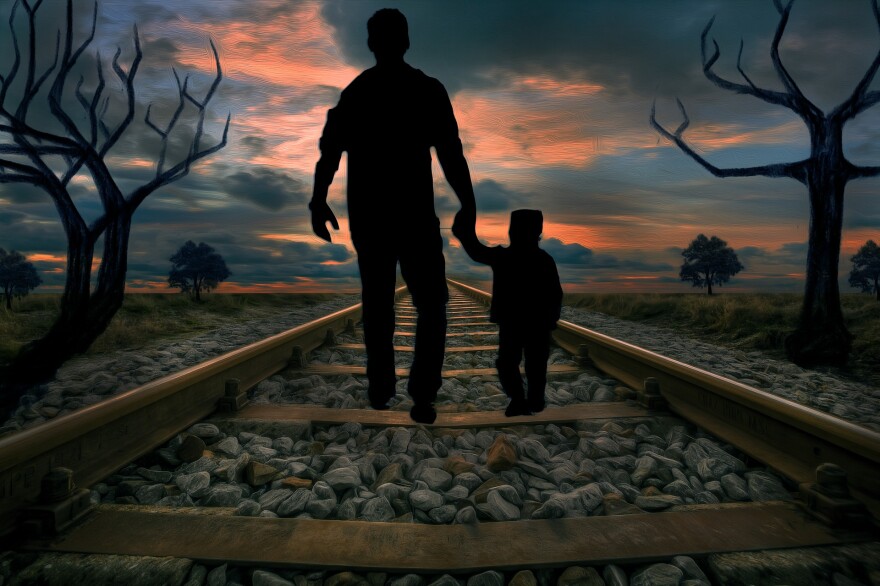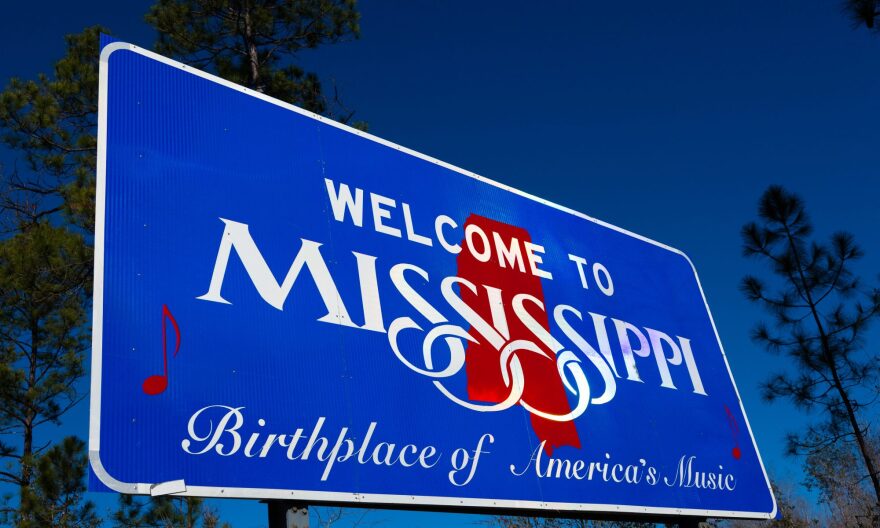Editor's note to our readers--this article contains content of an adult nature that may not be appropriate for all ages.
"So, I think we have more familial trafficking," says Teresa Collier. She’s with the Alabama Law Enforcement Agency, also known as ALEA. She’s considered the state’s point person on human trafficking. Collier works for ALEA’s Fusion center which deals in intelligence. That means she spends a lot of time interacting with federal and local law enforcement. Collier also does lots of interviews in the field with victims of trafficking in Alabama. And, she says she’s noticed a pattern.

"You might have a mom, where the only way she can keep her house or wherever she’s staying, is to let her landlord get access, sexual access, to her kid. That happens quite a bit,” she says.
In other words, familial trafficking.
“The abuse started for me, with him, just before my first birthday,” says Kelly Dore, a survivor of familial trafficking.
"And then it transpired, and when I was two and a half to three, he was allowing other people to abuse me," recalls Dore.
With familial trafficking, instead of someone coming in from the outside, a mother or father, or an aunt or an uncle, is the trafficker and a younger family member is the victim. You’ve heard from survivors who describe how traffickers preyed on their weaknesses to draw them in. Kelly Dore says her experience was more direct.
“He had threatened over and over that he would kill my mother, he would kill my brother, he would kill my grandparents on my mom’s side,” says Dore.

Teresa Collier says she concerned familial trafficking in Alabama isn’t just an issue—it could very well be the issue.
"The only reason I say that I feel like there’s so much familial pimping is because of my role as a forensic interviewer and I know what I have seen," she say.
“I would say it’s likely, of course,” says Wendy Bradford. She lives in Jackson, Mississippi. Bradford’s support of Teresa Collier’s position comes with a condition and it’s a big one.
"But I’ll say the same thing people said to me before we started the project, and that was you have to have the numbers,” says Bradford.
Collier says the project Bradford is referring to is why she considers Mississippi to be pretty much the gold standard when it comes to measuring familial trafficking.
“Basically, they took four counties in rural Mississippi, and they surveyed the children’s advocacy centers and other victims’ service providers, just top find out the most common type of trafficking that was going on, and it was familial,” says Collier.

So, we hit the road for Jackson, Mississippi to meet with Bradford.
“I was the liaison of the project," says Bradford. "I was one of the authors of the project, I was the editor of the project."
The human trafficking group Shared Hope teamed up with Belhaven University. Bradford founded the support group Beautiful Ones Ministries, which also took part. Thirty six interviews were conducted in the four counties surrounding Jackson. Bradford says Prosecutors were invited to talk, along with judges, service providers, law enforcement, and governmental agencies.
“So, nobody really, really, knew what the problem was. Most people were like…’we don’t have that here,’ like most other states and small towns…’we don’t have that here,’" says Bradford.
But, the study said otherwise. Familial trafficking was identified during interviews as the most common form of exploitation-- more than gang related, pimp related, or survival sex. That’s where minors sell sexual favors for either food or drugs. Bradford says a lack of education was one common factor leading to familial trafficking, and there was one more.
”I knew that poverty, obviously, is an issue in Mississippi. It’s…I mean, come on, it’s an issue just about anywhere in any state that you have," she says. "It’s just we happen to be in the bottom end of the barrel. That’s not a very popular answer, but it’s true…it’s just true.”
A general lack of awareness of trafficking was also pointed out as an issue. Bradford says there were also sympathy gaps among the officials who sat down to talk.
“Because it was so clear that they were looking at teenagers as prostitutes…calling them those names," she says.
Bradford says that was especially troubling because the people being questioned were the ones handling child sex trafficking cases. “You can’t bring awareness to that. You can’t open somebody’s eyes to that, at the place where they were. And, I wasn’t even sure how, to do that. So, we didn’t. We just cut the interview short,” Bradford says.
The final report in Mississippi also points to cultural issues that make some families more prone to trafficking their own children. That doesn’t appear to be a new topic.
“You know, a few years ago…gosh, looking back it was twenty years ago,” says Kelly Dore. Earlier, she described her experience as a victim of familial trafficking. She lives in Colorado. APR sought her out for an interview not just because she’s a survivor, but what she did about it. Dore currently helps write anti-trafficking legislation on the state and federal level. That interest was not only prompted by her own abuse, but an experience she had as an undergrad in college. Dore says she accompanied a professor to the Ozarks for a speaking tour.
"And, she was talking about how it wasn’t normal to have sexual relations with members in your family," Dore recalls. "And if someone in your family has been abusing you, or perpetrating on you, then what are you rights? You have the right to notify authorities and ask for help.” Dore says that’s when the situation went a little sideways.
“Several of the women got uncomfortable and they started walking away," says Dore. She chased after them to ask what was wrong. And, they told her.
“ In our culture, and with our families," Dore recalls. "If you’re over the age of sixteen and you have not been had by a male member of your family, then you’re not a woman.”
Wendy Bradford agrees with the notion of culture playing a role in familial trafficking. Her point is that no one should consider this just a southern thing.
“Why wouldn’t that kind of stuff occur…with poverty. It happens on the other side of the world, in Cambodia…I’ve visited Cambodia. The poverty over there…you’re celebrated If you have a girl, because she’s going to provide for you, through trafficking,” asys Bradford.
But, how does all figure into potential familial trafficking in Alabama? Bradford agrees that Alabama and Mississippi look a lot alike in terms of rural population, poverty, and a lack of education. All of these elements were pointed out in Mississippi’s report as factors related to familial trafficking. But, Bradford says that’s not enough…
“Unless someone is willing to pick up the torch, and do the research, and go through some type of thing like we went through. And say ‘okay, guys here are our statistics in Alabama.’ They told me we weren’t going to move forward unless we had statistics. That we’re not to going to get support," says Bradford.
“I tell law enforcement, and also the DA’s…’hey, this is a trafficking case,’" says Teresa Collier. "And whether they want pursue that or not, most of the time they don’t. Because it easier to do a lesser type of charge, like a sex abuse or something like that…it’s just easier for them to do that.”
And, both the tough sell and the tough audience show no apparent signs of changing, at least not yet.
Editor's note: If you or someone you know is being trafficked, Alabama Public Radio has a list of resources to help. Go to apr.org-slash-traffic for phone numbers and links to groups that support trafficking survivors. You can also text the word traffic to 855-353-6644.







